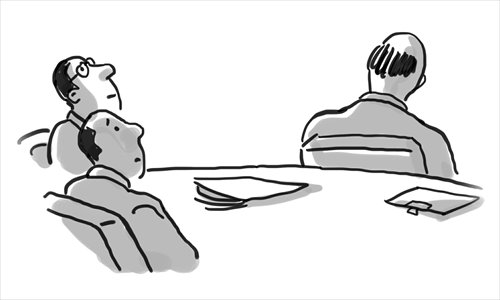HOME >> OP-ED
Future summits between East Asian powers depend on Japan’s sincerity
Source:Global Times Published: 2015-3-17 19:53:01

Illustration: Liu Rui/GT
After the meeting held among deputy foreign ministers of China, South Korea and Japan on March 11, the next stage is restoring the trilateral meeting among foreign ministers of the three countries, which has been confirmed to be held in late March, and paving ways for a three-way summit between the top leaders.What's harder, though, is to predict how far the steps the three sides will take to resolve tension and get closer. And this depends on whether Japanese Prime Minister Shinzo Abe will make a turnaround from his hawkish view on Japan's wartime history. Both Beijing and Seoul are facing historical and territorial disputes in their ties with Tokyo.
During the just concluded trilateral deputy foreign ministers' meeting, the three sides reached a consensus to resume the trilateral foreign ministers' discussions, which were suspended in mid 2012, when Tokyo illegally and unilaterally "nationalized" the Diaoyu Islands.
Since then, all the official contacts between China and Japan have been suspended, except for one interactive mechanism, which is the negotiations over the China-Japan-South Korea Free Trade Agreement (FTA).
It is unquestionably a sign that the three sides are willing to continue their trade and economic cooperation despite the political standoffs.
It is overwhelmingly believed that the upcoming foreign ministers' meeting will center on promoting economic cooperation, such as reactivating the negotiations over the China-Japan FTA as well as pushing forward to reach a consensus on the FTA among the three.
More importantly, the highly anticipated foreign minister talks will ignite the light of opportunity for a three-way summit which will be attended by the top leaders. It shows an upward turn in political relations of China, South Korea and Japan.
Since this year marks the 70th anniversary of the end of WWII, it's expected that this opportunity could be seized to ease tensions and move toward detente. However, whether this will come true depends on Japan, and particularly on Abe's speech during his upcoming state visit to the US in late April and his statement on war anniversary in August.
Many of Abe's political conundrums come from his own missteps. Take the recent moves of the Japanese government, such as its diplomatic spat with South Korea over the "comfort women" issue, with China over the Nanjing Massacre, and with the US on the revisions of its textbooks, as well as its recent push to reinterpret the right to collective-self defense, and its plan to use its Official Development Assistance funds to assist foreign military forces. All these factors prove how tricky it will be for Japan to enhance relations with China and South Korea.
In the light of such lingering tensions and irritating moves, Abe's statement will serve as a test for trilateral ties. Whether the three-way summit will be held smoothly, and whether the relations among the three countries will move forward, depend on what Abe will talk about, and whether he will modify the spirit of the prior Murayama and Kono Statements, which showed sincere regrets and offered an apology for Japan's past aggression.
It will also impact the trilateral economic collaboration. Even though we are trying not to mix politics with trade, if Abe shows little sincerity over Japan's historic militarism, it will unleash a storm of disappointment and objection from the people of China and South Korea. This will undoubtedly hinder the new progress for trilateral economic relations.
It is hoped that the upcoming high-level talks will encourage new momentum of the three-way ties, both economically and politically. But for now, one can only maintain an attitude of cautious optimism.
The article was compiled by Global Times reporter Li Aixin based on an interview with Geng Xin, a senior research fellow with the Chongyang Institute for Financial Studies, Renmin University of China, and chief researcher of the Japan-based China Studies Think Tank. liaixin@globaltimes.com.cn
Posted in: Debate, Viewpoint